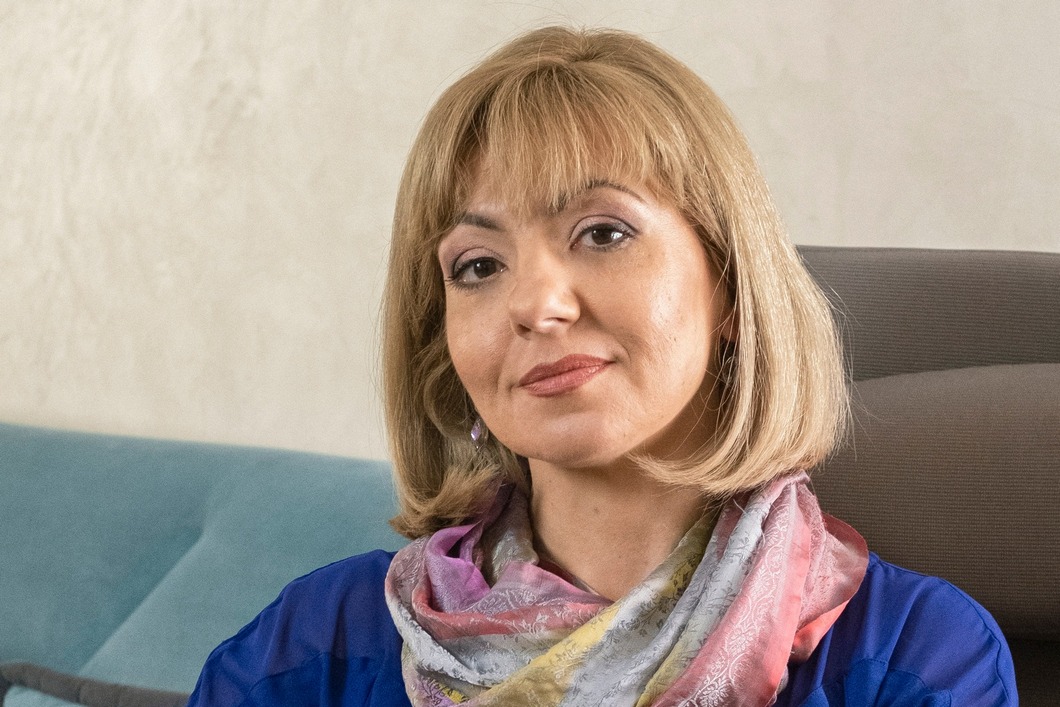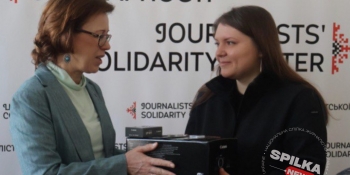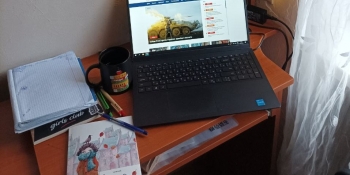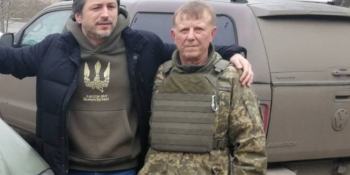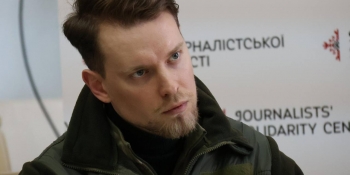During the war, it becomes increasingly difficult to get along with the closest people, who are separated not only by distance, but also by borders between countries. How to get out of this ordeal, preserving family relations and psychological balance during forced separation from relatives?
Experienced trainer / analytical psychologist and trauma therapist from the Prostir center, Maryna Breslavets, gave recommendations during the webinar called Separation from Loved Ones over the War: How to Preserve Psychological Balance and Family Relationship, organized by the National Union of Journalists of Ukraine (NUJU). The event took place on the site of a Journalists’ Solidarity Center of the NUJU.
In one way or another, this problem affects millions of Ukrainian families. There are families having a relative at the front. There are families separated from their husbands and dads by the border with European countries. There are families who moved from one region to another. Many families who remain in Ukraine have lost the opportunity to earn money.
Even if outwardly everything remained as it was in a complete family, people are still in a state of shock from stress and anticipation of harsh news. Of course, all this affects relationship with loved ones.
Many factors can worsen such relationship.
Sometimes we do not understand what is happening to our other loved half. We can have different views on the same situation, different emotional and psychological states. There was some kind of life before the war, relationships were established or not so established. And the war became a crisis for family life. This is a difficult crisis event, sometimes with a difficult traumatic experience. The war destroys the themes, plans, and the vision of a common future that used to be in the family before.
First of all, emotional exhaustion is one of the reasons. When a person is in a balanced, or as psychologists say, resourceful state, they can calmly respond to everyday domestic conflicts: for example, a husband came home from work tired, and children are quarreling.
If we have resourceful flexibility, everything is fine with us, we easily solve these problems. When we ourselves have insomnia, anxiety, panic attacks, constant hard news – people, and, above all, journalists, suffer witness trauma. In a state of emotional exhaustion, it is very difficult to cope with someone’s problems: the anxieties of children, husbands, our relatives. Therefore, the emotional reaction to a conflict or misunderstanding can be much worse than it had been before the war. We used to say, “Give me a hug, let’s talk about it.” This resource is not available now. A small word can cause an explosion.
Each of the partners has different experiences, and therefore is not always able to understand the feelings, experiences, and reactions of the partner. This can be a reason for misunderstanding. One wants to talk about their problems, another needs to be with them, and someone, on the contrary, wants to be left alone. Women, as a rule, need more communication, and men look for a “cave” to hide from encroachments.
Among the reasons that create tension are different strategies for planning the future. Some of the family members decide to return to Ukraine, some will stay abroad. At the same time, everyone experiences their own tragedy: both the husband who is fighting at the front and the wife who is abroad. They cannot understand each other’s problems: “You are not in the trenches (not in Ukraine, where there is no light and Shahed drones fly by).”
Relationships can also be affected by resentment for unmet expectations. Someone was hoping for help, for more support, for more emotional inclusion, but they didn’t get it. Conflicts can increase over money, children, work, and priorities. The consequences of stress can manifest in intimate life in the form of a decrease in sexual desire or adultery.
And yet it is important that the negativity of conflicts does not exceed the positive emotions in the relationship.
The main thing is not how we overcome conflicts, but how we live when they do not exist. Conflicts are an integral part of relationships. The reaction to difficulties on the part of the partner is important. The main thing is to understand how we react, and how our partner reacts.
To understand the reasons for this or that reaction, you need to have certain knowledge of psychology. Experience gained in childhood can influence the behavior of an adult in stressful situations. In modern psychology, there is a theory of attachments, or affections.
Attachment, types of attachment
In 1960, the American psychologist Mary Ainsworth observed mothers and children in the first year of life and identified several types of children’s reactions to mother’s care.
Reliable attachment is when children are independent, open, active, and mothers are calm and emotionally available. In adult life, people with secure attachment know how to rely on themselves in difficult situations. They are open and easily tolerate loneliness. They appreciate a partner, but do not cling to a relationship.
Anxious (ambivalent) attachment in adult life manifests itself in the fact that a person feels lonely and useless, very dependent on relationships. They often get offended and complain about their partner, their attitude changes from love to hate. In family life, such people are very worried when someone goes somewhere. Strong aggression may appear. On the one hand, a person understands that the partner went to the front, or the partner went abroad because there was no other choice. At the same time, they feel they have been abandoned. This is where the offense comes from.
Children with anxious-avoidant attachment appear confident and independent, but contact their mother rarely and even avoid contact. Growing up, such people try to isolate themselves from the world, seek to close emotionally. From the outside, they look independent and self-confident. But their callousness and arrogance are a defensive reaction to avoid the pain of rejection. At the moment of conflict, they remain silent, slam doors, become unavailable, break contact and try to suppress the need for closeness. They perceive themselves positively, and their partner – negatively, in any response they feel accusations or criticism.
Disorganizing (disoriented) attachment. There can be conflicting emotions here. On the one hand, a person can actively demand attention, showing love, and then push away or withdraw. A disorganized type of relationship affects children who are often beaten and bullied. In adulthood, people with this type of attachment can be torn by contradictions: sometimes such a person wants to give up the relationship, sometimes wants to break up. Then he or she really needs their partner to be around, then in just a glance, they want to break up.
It is important to understand what type of attachment we and our partners belong to.
If we have anxious attachment and our partner has the avoidant one, and we do not understand that, we will have additional images appearing. A person with anxious attachment wants more contact: to be held by the hand, to be called often, etc. And a person with avoidant attachment will withdraw from contact during disturbing events. Based on some words, they try to separate, and this can lead to additional images that need to be talked about, that need to be clarified in the relationship.
Weaknesses in people with different types of attachment become exposed during periods of stress, as they come to the surface. It is also important to understand that during conflicts the emotional reaction to some words or remarks is too demanding.
“For example, we were told that the dishes were not washed, and there was more emotion to this remark than it was worth. It means that we get into some situation that reminds us of the past. A person who is in a resourceful state will react calmly to such a remark, and there will be no conflict. But if there is emotional exhaustion or a state of emotional anxiety, a person may subconsciously recall the words of his parents heard in childhood: “You are a bad housewife, no one will marry you, you cannot be relied on.” Some painful topics and emotions from the past were impossible to release. And here there is one spark – and we have emotions not only about the situation, but also from our past,” comments the psychologist.
When we are go nuts, it is important to ask ourselves: “What is it about? How old am I now? Maybe I feel like a five- or seven-year-old child right now, and that’s why I have so many emotions?”
Our greatest expectations from the family are about support, the need for affection, warm feelings, and acceptance. Our partners strive for the same. A huge share of the reasons why spouses divorce is the lack of a sense of their importance and necessity.
According to Maryna Breslavets, there are four “horsemen” that destroy relationship.
Criticism. (Why haven’t you ever?.. You always… And again you have…). The partner perceives these messages as “You are bad.” A person with avoidant attachment will withdraw themself, slam the door, and experience heavy, overwhelming flood of emotions.
Contempt, sarcasm, cynicism, mockery, a bad joke all mean passive aggression. (What can you do anyways?)
Protective reaction. (It’s not about me, it’s about you. I just didn’t have time…). Accusations, moralizing, when there is a lot of criticism, a person first tries to defend themself. There can be a strong conflict: “I do so much, and you don’t appreciate it.”
Partners feel distanced from each other. Some believe that as long as a woman screams and makes excuses, there is an opportunity to fix something. When she shuts up, the man can breathe a sigh of relief: “At last I got some peace.” In fact, she lost hope of changing something and separated. The person does not answer, hides behind the computer, stays silent, goes to another room. If you are in different countries, you do not call each other or call each other very rarely, there is nothing to talk about.
During a crisis, it is important to understand how to get out of the conflict.
First of all, partners should recall the friendship relations they had before the war, or reanimate pleasant pre-war memories: the “candy-bouquet” period of life, joint vacations, family holidays and traditions. It’s what we rely on when we’re in a crisis. We remember how it used to be and we dream that we can return to it.
It is very important to understand each other’s wishes, dreams, and expectations. This can be found out only during a conversation, because our dreams and expectations from each other change during life. They are transformed during war as we may need more support and emotional contact. We can’t read each other’s minds. It may seem to us that a partner should already understand what we need. But in reality, you just need to say: “I’m sick right now, I feel helpless, I can’t handle my emotions, I need your support.” We can ask our partner what he needs: “What do you need to feel that I love you? Then we feel ourselves important and valuable.”
Attention to detail is important, as well as the ability to express one’s tenderness and admiration to another person.
I often hear that a wife admits that she did not notice how much her husband used to do for the family. Now everything, from utility payments to repairs, rests on her shoulders. We usually don’t notice it and don’t thank for it. So, if you are now next to each other or even in different countries, you can thank each other for what happened between you, for the domestic or emotional support you received. Attention lies in little things, when we can do something together and not feel that we are alone.
There are rules of conversation that reduce stress. Its purpose is to listen to each other and provide emotional support. The conversation can be held both online and if you are in the same apartment together. It is necessary to determine the time frame of such a conversation. A person who is nearby, or at the front, or abroad, can share their emotional state.
It is important not to rush with advice. It’s not about advice anymore, it’s about feelings. It is important for a person to hear: “You are my girl, what a great burden it is on you now.” No need to solve the problem. Emotional support is what really needed in such a situation.
While listening, show curiosity, ask questions: “How was your day? What did they tell you? How did you answer?” etc.
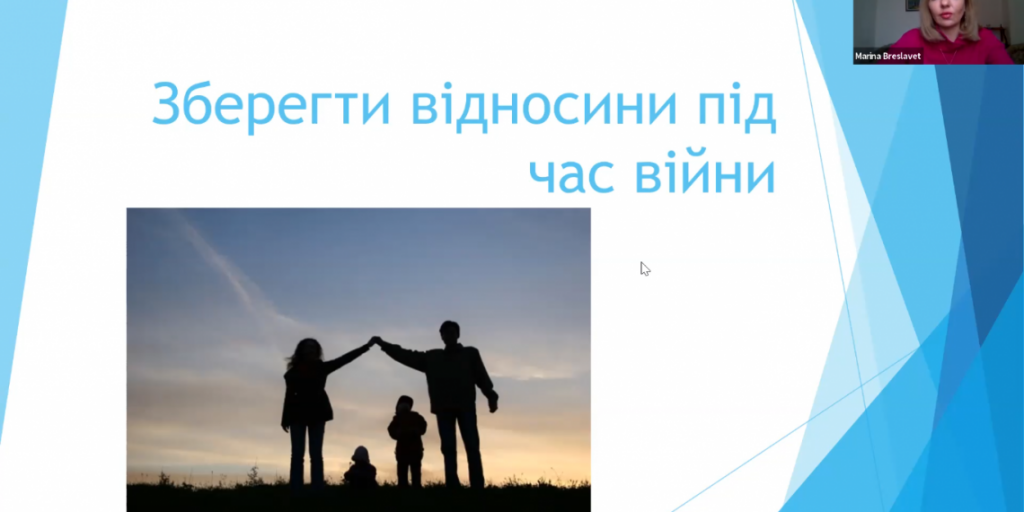
Show empathy: “I understand why you’re so upset.”
Always take your partner’s side and don’t start criticizing them. No You’re wrong’s or You made a mistake.’s We are a team, we are together against the others. As in childhood we wanted our parents to protect us and always be on our side, so we are always on the side of our partner.
Confirm emotions: “Yes, it’s sad”, “It’s infuriating”, “It is so difficult for you!”.
The crisis exposes all the weak points of relations, Maryna Breslavets continues. If previously the relationship was abusive, there was a lot of criticism or depreciation, then during the war these moments can manifest themselves with greater force and lead to a divorce.
It is important to say to each other: “I understand that it is difficult for you too. Our experiences and difficulties are different, but we can support each other.” No matter how different our pain is, we need to support each other. The last thing we can do is measure whose pain is greater.
Webinar participants had the opportunity to ask Maryna Breslavets their questions. In particular, one of the questions sounded like this: “Does the presence or absence of conflicts depend on the understanding of mutual respect and the real perception of the situation?”
Conflicts are an integral part of relationship. The absence of conflicts is not a marker that everything is fine in the family. Sometimes, if we are talking about a person with avoidant attachment, their feelings can be contained and not manifested in any way. But when resentments and difficult thoughts pile up, silent tension can accumulate. There are conflict rules where we do not apply “you-message”. It is important when we can say in a conflict: “You are valuable, important, and loved. But I don’t like this act.”
Sex during war
The sexualization of war happens all the time. However, sexual desire in women and men is different. It can increase and decrease against the background of some traumatic events, the threat of death, and does not depend on gender. After Bucha, many people cannot pronounce the word “sex”. The reason is obvious: during the Russian occupation, there was a trauma of violence in Bucha. This traumatic event involves many difficult emotional experiences and can completely change a woman’s attitude towards her body. In this case, the help of a psychotherapist is necessary.
One of the participants of the webinar admitted that during the siege of Chernihiv, she reread letters from her mother, whose voice she had not heard during her school years.
The love of relatives is our support. The stories of our family can be a huge resource. The war can raise our ancestral memory, when grandparents experienced the Second World War. These stories, how they coped when someone’s husband was at the front, and someone was in the occupation, on the one hand, can cause additional pain. But they can also become a huge resource. We say that our grandmothers managed it, they did it, and we can too. We imagine that our ancestors are standing behind us, they have experience that we can live with as well.
Another question related to how to learn not to miss relatives who are abroad.
We will still be sad, because we are alive. We will not be sad if we are indifferent about this person. There can be a state of numbness, when we do not feel anything at all. Probably, since the beginning of the war, everyone felt such a state. But we cannot be in it all the time.
You should make yourself busy. A person needs physical activity, at least a walk. This advice also applies to overcoming stress, because all experiences and emotions remain in our body. 5-10-minute exercises, as well as learning a foreign language, will come in handy. It is enough to master at least 5-10 words a day so that obsessive thoughts do not return and do not run in circles.
We can call more often and talk more with our relatives. It is important not to lose this connection when we are in different countries. Tell us how your day went. Even minor details are important. You can remember the past, shared holidays, a first date, dream together about the future when the war ends. An emotional connection must remain.
Another question was about how to overcome panic attacks when relatives at the front or in the occupation do not communicate.
During panic attacks, our imagination paints scary stories, and this process cannot be controlled. So, the first thing we do is return to our body, take short breaths and long breaths. It is necessary to return to reality “here and now”.
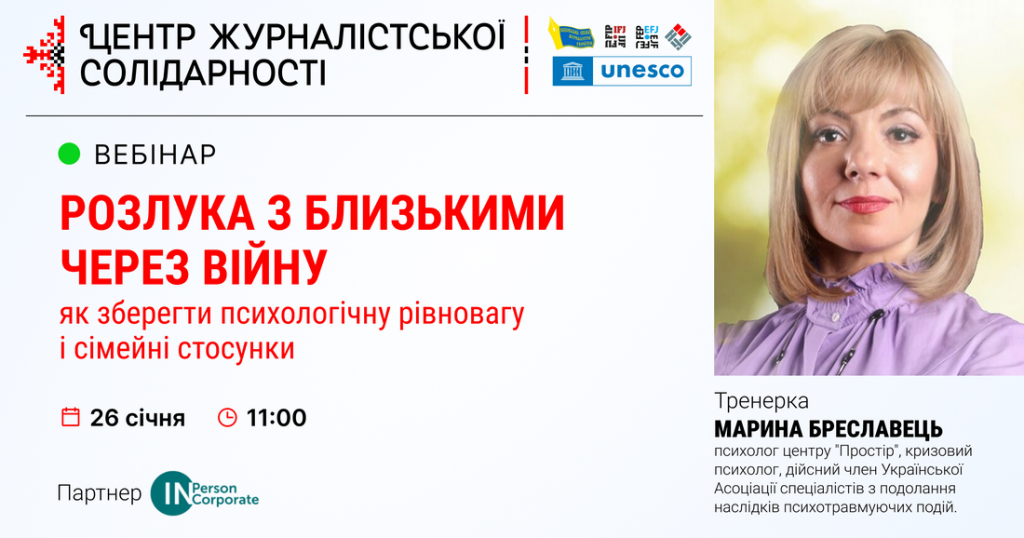
People who often experience panic attacks should have a piece of paper with recorded exercises. For example, find five red or green objects. If the panic attack is very strong, you should talk to yourself about what you see around you: a child in a red overall, a green car, a fluffy dog, etc. Next, we track what sounds we hear, as well as smells. You can touch different surfaces and say, for example, that the laptop is smooth and warm, the table is rough, the blanket is nice and warm. You can stomp your feet, make various movements. In this way, we come back to reality and feel where we are at this moment.
In general, adds Head of the IN-Person Corporate network Nataliya Nalyvaiko, all fears actually live in our fantasies. So, you should always remember this.
Journalists’ Solidarity Centers are an initiative of the NUJU implemented with the support of the International and European Federations of Journalists, as well as UNESCO. The initiative is designed to help media representatives working in Ukraine during the war. Such Centers operate in Kyiv, Lviv, Ivano-Frankivsk, Chernivtsi, Zaporizhzhia, Dnipro and provide journalists with organizational, technical, legal, psychological and other types of assistance.
About UNESCO
UNESCO is the United Nations Educational, Scientific and Cultural Organization. It contributes to peace and security by promoting international cooperation in education, sciences, culture, communication and information. UNESCO promotes knowledge sharing and the free flow of ideas to accelerate mutual understanding. It is the coordinator of the UN Plan of Action on the Safety of Journalists and the Issue of Impunity, which aims to create a free and safe environment for journalists and media workers, thus strengthening peace, democracy and sustainable development worldwide. UNESCO is working closely with its partner organizations in Ukraine to provide support to journalists on the ground.
The designations employed and the presentation of material throughout this publication do not imply the expression of any opinion whatsoever on the part of UNESCO concerning the legal status of any country, territory, city or area or its authorities, or concerning the delimitation of its frontiers or boundaries.
The author is responsible for the choice and the presentation of the facts contained in this publication and for the opinions expressed therein, which are not necessarily those of UNESCO and do not commit the Organization.
Written by Liudmyla Makei









